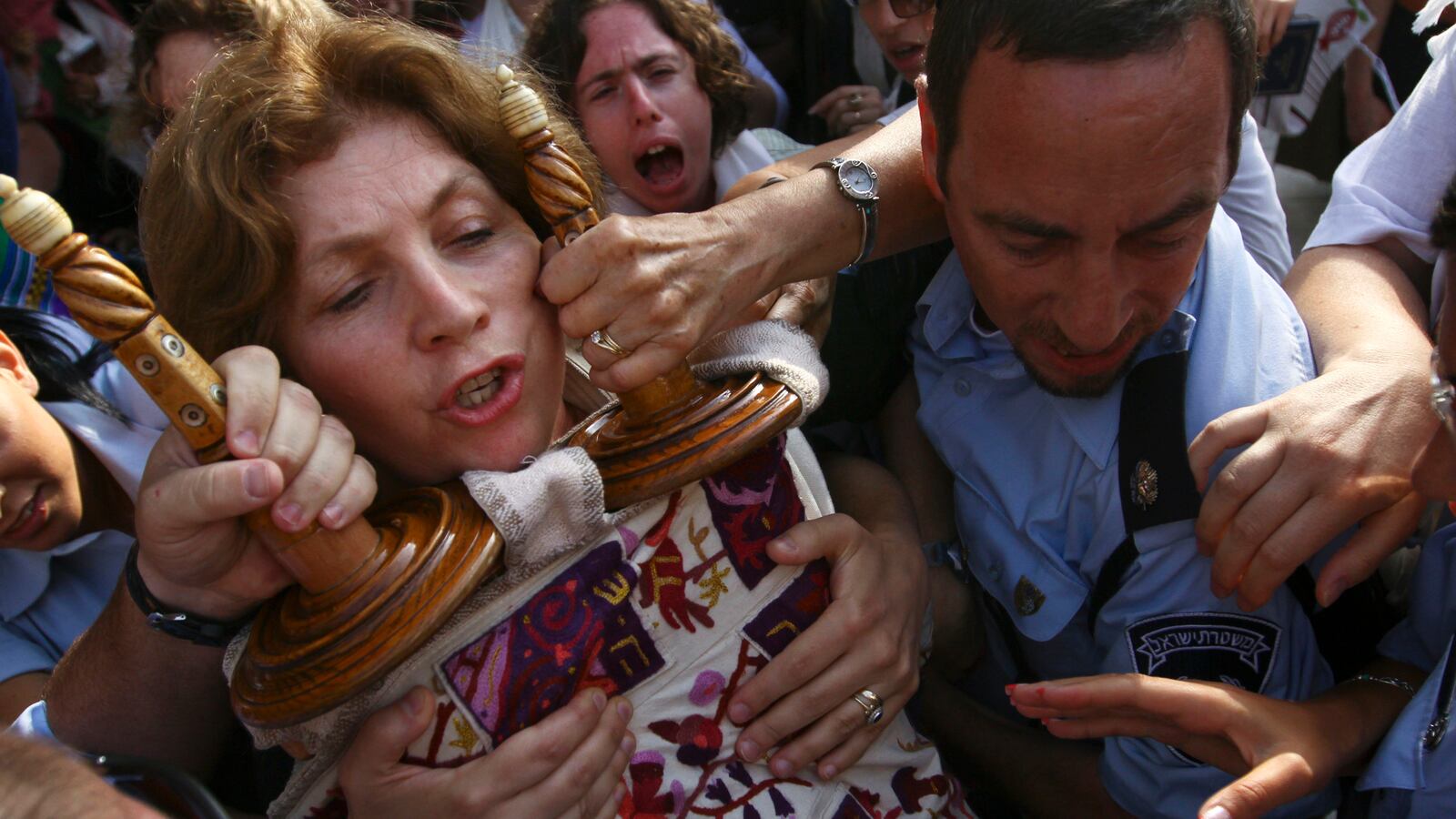It’s 7 a.m. on the first day of the Jewish calendar month of Nissan. There's a glorious Jerusalem breeze and the sky is a bright baby blue. A woman, probably around my age, is shouting at me that I (well, me and the people I came to support) am the reason the Holocaust happened. She goes further: Women of the Wall are the reason for all of the troubles of the Children of Israel. And, finally, she dispenses the worst possible insult she can imagine: These women, wrapped in prayer shawls and singing sweetly are not Jewish at all. They are goyim.
Women of the Wall have been coming to pray at the Wall every month for 24 years. Anat Hoffman has been arrested countless times. And the organization made a huge impact on the American Jewish conversation about Judaism in Israel—each arrest washes in a sea of op-eds and reports. Last month was no exception: with ten arrests, among them, Sarah Silverman's rabbinically ordained sister and 17-year-old niece, it was hard to miss in the English-language (Jewish and non-Jewish) press. For liberal American Jews, Women of the Wall champion the basic civil liberty that they hold dear in the United States: the freedom of religion. These women are fond of saying that Jerusalem is the only place in the Western World where Jews can't practice their religion freely. And American Jews respond to that message—it makes them want to go put on a prayer shawl at the Western Wall in protest. And they do. This month there were over a hundred women who showed up. But Israeli Jews often see things differently.

Yizhar Hess, executive director of Israel’s Conservative movement, only a few months ago said that a central problem is that “Israelis view the Wall as something not relevant to day-to-day life.” He added, “What could have been a national symbol to connect Jews from all over the world is now only an Orthodox synagogue.” And so when three MKs showed up yesterday—Stav Shaffir (Labor), Tamar Zandberg (Meretz) and Michal Rozin (Meretz)—Israelis finally took a little bit of notice. The message they sent was broad. Stav Shaffir, for example, was quoted as saying that she "feel[s] it’s an obligation and a great privilege to stand here and see to it that all the Jews in the world can pray however they desire." But again, Stav and her fellow Knesset members didn't know the words to the prayers, or the tunes, and for them this was a symbolic stand for civil liberties, not necessarily about American Jewry's sensibilities. Both Hess and Shaffir are saying that women's prayer at the Western Wall is not top on the average Israeli's priority list. Nor should it be—this country has bigger fish to fry.
And though Women of the Wall matters to the Israeli left, even if only peripherally, the Israeli right either totally ignores them or—if they're a bit more radical and outspoken—openly disdains them. Habayit Hayehudi MK Uri Ariel said that Women of the Wall's "growing extremism" is what will "bring all of us to a 'civil war,' God forbid, in the Kotel plaza." What he meant was that his Israeli Judaism couldn't stomach American Judaism's demands. Likud MK Miri Regev condemned the liberal MKs’ actions, saying they "hurt the feelings of the Jewish people and the public in Israel" and calling the gathering a "provocation". Perhaps MK Uri Orbach, slated to become the next Jerusalem and Diaspora Affairs Minister, said it best in a comment on the non-Orthodox (primarily Reform) community he will soon represent: "Until [they] manage to bring to Israel half a million Jews," he said, "they will remain an organization that makes its impact by petitioning the Supreme Court and by publicizing provocative press releases…"
And liberal Jews can't, or perhaps refuse, to understand why this kind of religious feminism isn't a priority. Nomi Teutsch, a New Israel Fund Shatil Social Justice Fellow living in Jerusalem for the year, had been to Women of the Wall's services in February and had seen the chaos of the arrests. When she came again this month, she told me that this time, the vocal protests of ultra-Orthodox women made her "sad…and defiant." She was, like many, upset by the fact that this issue continues to concern only a small minority, and had decided that she was willing, as an American Jew, to take the lead on this issue in Israel. Because, she said, "while so many American Jews consider observant Judaism and feminism to be obviously compatible, that idea is still just picking up steam here in Jerusalem." Nomi grew up with Women of the Wall; she said she had always seen them as "kind of heroic"—at the forefront of the battle for feminism-and-freedom-of-religion in Israel. And that's true for most American Jews, the majority of whom see no contradiction between subscribing to a secular worldview while simultaneously seeing themselves as religious, something nigh on incomprehensible in Israel.
And this worldview clashes not only with the secular left and illiberal right in the government. If you were to ask the Chief Rabbi of the Wall, he would tell you it's because such activity does not conform with "local custom." And actually, that's true. This is not to say that "local custom" is a legitimate excuse to impinge on civil liberties, but the fact remains: the locals—like the woman who yelled at me—believe what Women of the Wall are doing is at best forbidden by the Torah (it's not) and at worst distancing the Jewish people (quite literally) from divine salvation. That means that there's something real at stake in these once-a-month prayer wars. It's a clash of cultures on the most basic level.
So while it's true that it's a big step when there are solidarity gatherings for Women of the Wall across the U.S., and it's a good step when Israeli MKs show that they're interested, I'm not terribly optimistic. The anguish felt by the ultra-Orthodox woman who accused Women of the Wall of being responsible for the Holocaust was real. She felt that their activity desacralized a place of holy refuge. At various intervals she would say things like "my heart aches when I see them" or " I can't cry silently." The pain she felt was real. For her, this is a fight for truth. For Torah. For the single, proper path. And Women of the Wall were getting in the way. For her, they could only be goyim.






